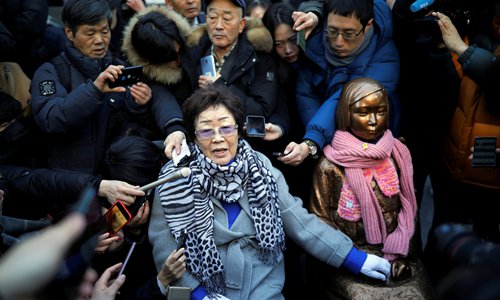HOME >> OPINION
Tokyo should give ground to resolve tensions with Seoul over ‘comfort women’ issue
By Su Hao Source:Global Times Published: 2019/6/24 18:18:40

Former South Korean "comfort woman" Lee Yong-soo sits next to a statue symbolizing former South Korean "comfort woman" during the funeral of a former South Korean "comfort woman" Kim Bok-dong in Seoul in February. Photo: VCG
The G20 summit will take place in Osaka, Japan on June 28 and 29. Tensions between Japan and South Korea have grown recently, amid disputes over issues such as compensation for wartime forced labor. Whether formal or informal talks between Japanese Prime Minister Shinzo Abe and South Korean President Moon Jae-in will take place during the summit has caught global attention. But if they cannot hold a bilateral meeting, there may be no solution to the Seoul-Tokyo standoff.
The main constraint on Japan-South Korea ties lies mainly in historical problems, especially regarding "comfort women," an issue that has long been behind anger directed at Japan by both South Korea and China.
Former South Korean president Park Geun-hye reached an agreement with the Japanese government over the issue in 2015 and Japan made an apology and offered to pay 1 billion yen ($8.3 million) in compensation for the victims. South Korea said it would regard the issue as "finally and irreversibly" settled if Japan kept its promise.
However, the deal was rejected by current President Moon Jae-in. South Korea said in early 2018 that the deal did not meet the victims' needs and appealed for more from Japan, while Tokyo said the deal should not be revised. This has led to a deadlock.
Japan and South Korea are important allies of the US in Northeast Asia, but deepening tensions between the two countries do not have a fundamental impact on US interests in the region. The US is confident that both countries depend on it, especially for security. US President Donald Trump is more concerned about economic ties with both of them and will not meddle too much in their historical disputes. Therefore, during the G20 summit, Trump may not make efforts to coordinate ties between the two Asian allies.
However, Tokyo-Seoul tensions may be eased since the standoff is detrimental for both countries. Japan and South Korea have close economic relations and the political tensions are not positive for trilateral cooperation between China, Japan and South Korea.
Relieving these tensions will mainly depend on Japan's attitude. If Japan relents, it will be easy to reach a solution. But currently, Japan is not giving any ground on this issue, which could hinder the further development of Japan-South Korea ties.
Park's "comfort women" agreement is unpopular among the public in South Korea. Park is seen as having betrayed these wartime victims by signing the deal with Japan as she failed to adequately listen to their voices. Therefore, given the strength of domestic public opinion, the Moon administration will not easily compromise with Tokyo.
However, at present, it will be hard for Japan to make concessions, as Tokyo insists the issue has been settled with the previous South Korean government.
Another reason might be that it does not attach much importance to its ties with Seoul and somewhat looks down on its neighbor, making the row harder to resolve.
It is noticeable that China also has a dispute with Japan regarding the "comfort women" issue. The current Tokyo-Seoul ties may work as a reminder for Japan that if it fails to address historical issues, Beijing-Tokyo ties could also be affected.
The author is founding director of the Center for Strategic and Peace Studies at the China Foreign Affairs University. opinion@globaltimes.com.cn
Posted in: